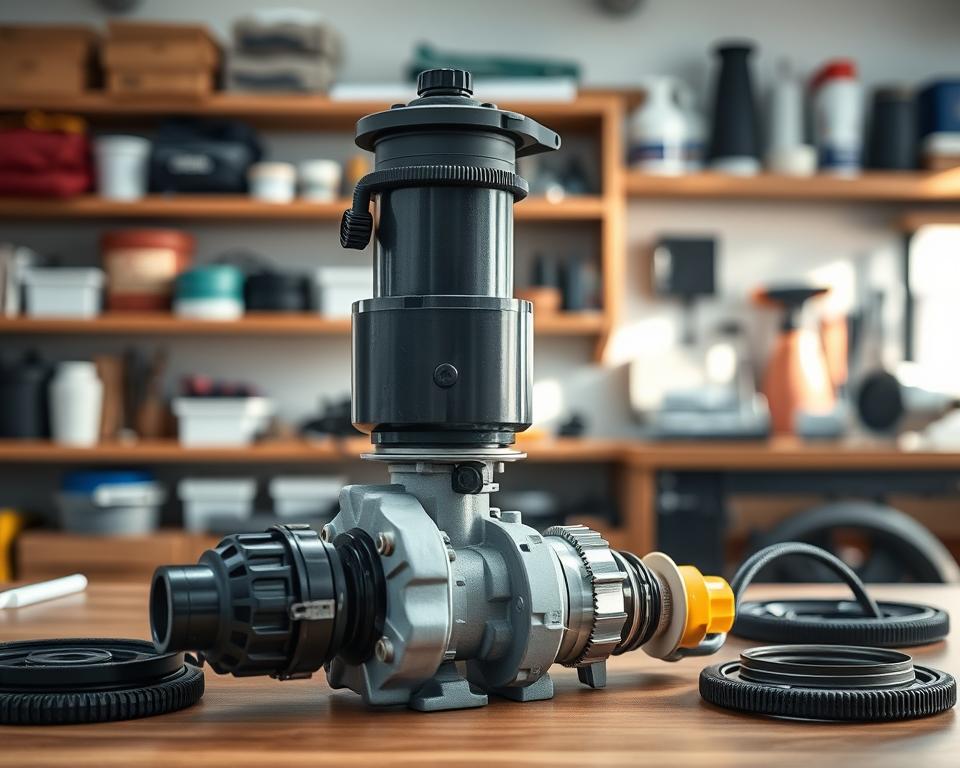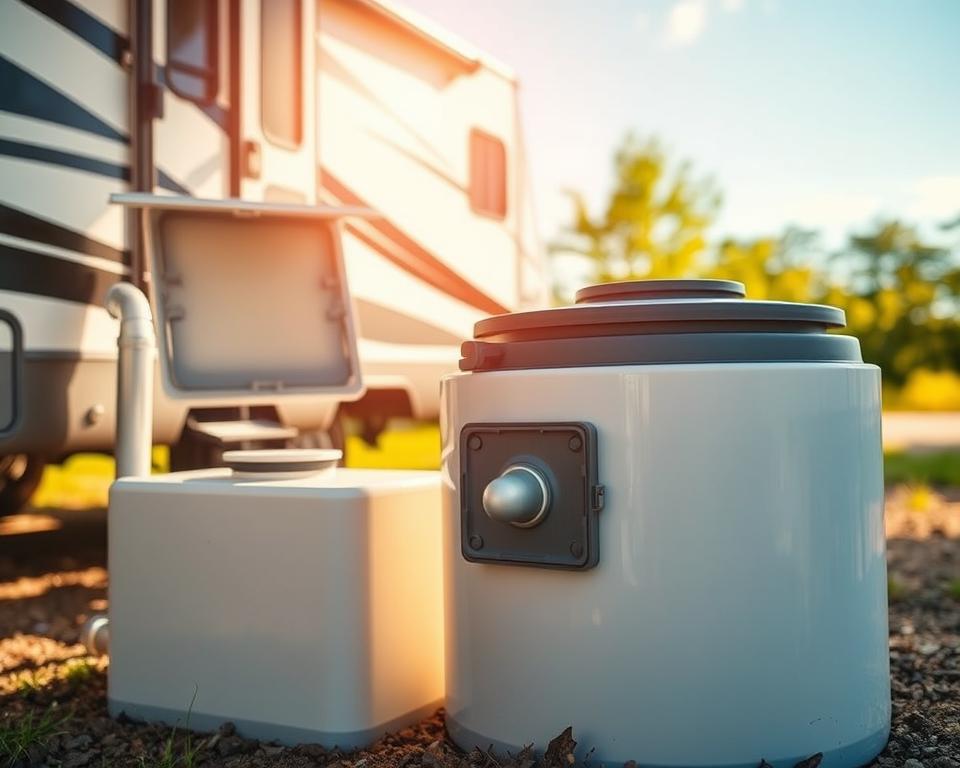RV Septic Tank Pumping – Comprehensive Guide
Have you considered the consequences of ignoring your trailer’s septic system? For those owning RVs and mobile units, it’s critical to recognize the essence of RV septic Tank Pumping. It guarantees your road adventures are trouble-free and living conditions stay sanitary while on the move. By prioritizing regular RV waste pump, this guide strives to make you ahead of the game in caring for your septic system, sidestepping potential problems — notably when enjoying the great outdoors.
In this article, comprehensive guidance into finding solid mobile septic services is laid out. Additionally, discover to identify when your septic Tank needs urgent attention. Understanding the process for proper RV septic Tank Pumping is also covered. Instead of scrambling to issues as they occur, enable this guide to furnish you with critical knowledge. This ensures your RV experiences stay stress-free!
The Importance of Routine RV Septic Tank Pumping
Regular servicing of your trailer’s septic Tank is paramount for its wastewater system’s efficiency. Ignoring this can cause clogs and backups, spoiling your vacation and hurting the environment. Sewage leaks from an excessive Tank can contaminate the area, posing major hazards.
Teaming up with professional Pumping services like All in Sanitation is a smart move for trailer owners. This step stops issues and improves your system’s functionality and longevity. Timely Pump-outs mean a safer, safer environment in RV parks and campgrounds.
Understanding Your Trailer’s Septic System
A trailer septic system includes three primary elements: the black water Tank, grey water Tank, and fresh water Tank. For RV owners, it’s important to know these parts. They are central in waste management. The black water Tank stores toilet sewage, and the grey water Tank receives water from sinks and showers.
Each Tank has a specific role in ensuring the trailer clean and operational. Keeping an eye on the levels in the black water and grey water Tanks is vital. It prevents overflows, bad smells, and damage to the septic system.
For a clearer understanding, below is a table that compares differences between the black water and grey water Tanks:
| Feature | Black Water Tank | Grey Water Tank |
|---|---|---|
| Purpose | Stores sewage waste | Collects wastewater from sinks and showers |
| Maintenance Frequency | Requires frequent Pumping | Needs infrequent emptying |
| Potential Issues | Odors, blockages from solids | Risk of grease buildup |
| Typical Size | Generally bigger than grey water Tank | Smaller than black water Tank typically |
Knowing your trailer’s septic system is cornerstone for maintenance. It guarantees hassle-free travel experiences. Staying mindful of both Tanks translates to trips with no septic concerns.

Red Flags Your Septic Tank Needs Pumping
It’s essential to know when your septic Tank needs Pumping to maintain your system sound. Identifying issues early can help avoid major repairs and environmental harm. Primary signs that require attention include:
- Slow draining sinks, which may point to a full Tank or clog.
- Gurgling toilets, hinting at blocked pipes or a failing septic system.
- Foul odors around your trailer, an early warning of rising sewage.
- Pooling water near the drain field, revealing that your Tank may be overwhelmed.
- Sewage backups in your toilets or drains, a clear sign urgent action is needed.
Becoming aware of these signs empowers RV owners to take quick action, heading off grave issues. Monitoring your system and responding to these indicators can lengthen your septic system’s lifespan. This approach leads to a better RV experience.
What Determines Pumping Frequency
A septic Tank’s capacity significantly affects how often it needs Pumping. Larger Tanks need fewer service because they hold more waste, while smaller Tanks call for more frequent Pumping.
The rig count using the septic system also influences Pumping frequency. With more RVs, the system experiences increased strain, necessitating accelerated Pumping. Notably through peak seasons, adjusting the schedule is key to avoid problems.
Here is a table that summarizes recommended Pumping intervals based on typical scenarios:
| Septic Tank Size | Number of RVs | Recommended Pumping Frequency |
|---|---|---|
| 500 gallons | 1-2 RVs | About every 2-3 years |
| 1000 gallons | 2-4 RVs | Every 3-5 years |
| 1500 gallons | 4+ RVs | Approximately every 1-2 years |
Thoughtfully determining your septic Tank’s Pumping frequency optimizes its operation. It also prolongs its life and effectiveness. This selection is critical for maintaining system health.
Finding a Dependable Septic Pumping Service
Choosing a dependable septic Pumping service is essential for your RV’s septic system health. It guarantees quick and thorough Pumping, averting expensive future repairs. When looking for a septic service provider, focus on these critical aspects:
- Experience: Look for companies with a strong track record. Their experience with various septic systems, especially those for RVs, is paramount.
- Customer Reviews: Read online reviews and testimonials. High feedback and strong ratings are indicators of a dependable provider.
- Response Time: Rapid response times reflect a company’s focus to their customers and readiness to meet their needs efficiently.
- Knowledge of Systems: Deep knowledge of RV septic systems distinguishes some services. Providers like All in Sanitation understand these systems well, enabling customized service.
Prioritize these considerations to get the most suitable service for your septic requirements. A reliable septic Pumping service boosts your system’s life and performance, allowing for carefree travel adventures.
Trailer Septic Tank Pumping: The Process Explained
Trailer septic Tank Pumping requires critical steps for efficiency and safety. It’s crucial for RV owners to know this process before service appointments.
A technician with a trailer-mounted Pump shows up first, suited for mobile systems. This technology allows effective waste removal while defending the environment. They attach the Pump to the trailer’s system with a hose reaching the Tank.
The Pump then extracts the waste out of the Tank. This action is essential to maintain the septic system sound and prevent overflow. After emptying, the technician assesses the Tank for damage or wear, confirming proper function.
Following the Pump-out, waste disposal is necessary. The hauled waste is delivered to treatment facilities for safe processing. This step limits environmental harm.
The process benefits from the trailer-mounted Pump’s speed. Regular service reduces time and cost, keeping the septic system in excellent condition.
Rapid-Response Septic Pumping Services
Unplanned issues with your septic system can demand immediate intervention. For RV enthusiasts, recognizing when to call for emergency septic Pumping is vital to avoid further damage and excessive costs. Situations needing immediate septic Tank Pumping include backups, unpleasant smells, and sewage leaks. Swiftly tackling these issues often requires septic Tank Pump and haul services to quickly eliminate waste and restore system functionality.
Providers like All in Sanitation offer 24/7 emergency septic Pumping, ensuring help is readily available when urgently needed. Taking initiative with these services significantly boosts your septic system’s lifespan and performance. Having a trusted septic service close at hand can lower expenses and stress in emergencies, delivering uninterrupted enjoyment of RV adventures.
Smart Moves for Maintaining Your RV Septic System
Keeping your trailer’s septic system in peak shape is critical. Smart maintenance strategies can prevent expensive problems later. Kick off with regular checks for damage, leaks, or strange smells for RV septic Tank care.
Sensible waste disposal is key for a healthy system. Never flush items that won’t break down, and stick to septic-friendly products. It’s essential that everyone knows how their actions influence the septic system. This guarantees it stays functional and efficient.
- Carry out routine checks for leaks and unusual odors.
- Stay in touch with your septic service provider for timely maintenance.
- Utilize septic-safe toilet paper and cleaning supplies.
- Stop pouring chemicals down the drain that could disrupt the balance of bacteria in the Tank.
- Arrange for regular professional inspections to spot potential issues early.
Following these steps assists RV owners extend their RV septic systems’ life and performance.
Usual Troubles with Trailer Septic Systems
Mobile septic systems often experience issues that plague RV owners. Handle these issues early to prevent bigger problems later. Clogs in septic Tanks are common, mainly due to not disposing of waste properly. To avoid clogs, choose RV-safe toilet paper and conduct regular maintenance.
Another big issue is odor control. Bad smells can point to backups or leaks, needing immediate action. To reduce odors, verify the system is well-ventilated and the septic Tank is emptied as needed.
Leaks can appear from wear or incorrect installations. Fast identification of leaks helps avoiding environmental damage and keeps the system working. Periodic inspections are important to spot these issues early.
To prevent common issues, use preventative strategies like regular care and proper waste disposal. Informed and proactive RV owners can enjoy their travels stress-free and with peace of mind.
The Final Word
Mastering RV septic Tank Pumping is vital for RV and camper owners. Routine maintenance and recognizing trouble signs in your septic system can elevate* your RVing experience dramatically. Managing your RV’s septic system well guarantees both safety and comfort during your outdoor adventures.
Choosing a dependable service for your camper’s septic Tank Pumping is essential. Working with experts like All-In Sanitation secures your mobile waste management is high-quality. This approach is not just green, but it also enhances the camping experience, making it more enjoyable and sustainable.
Actively maintaining your septic system cuts emergencies, enhancing your nature stays. Thorough care and knowledge enable memorable trips for the best reasons.


